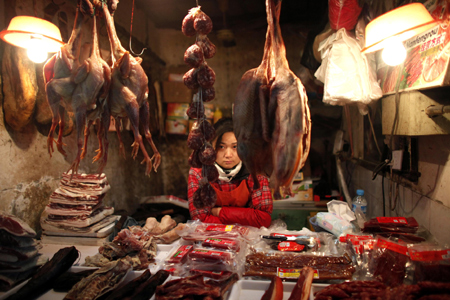Statistics
Inflation eased in December
By Wang Xiaotian (China Daily)
Updated: 2011-01-21 13:53
 |
Large Medium Small |
A meat vendor waits for customers at a market in Shanghai on Thursday. Pressure on China's CPI eased a little in December to 4.6 percent, down from 5.1 percent in November.?[Photo / Reuters]
Despite slowdown, nation still faces price-surge challenges, experts say

BEIJING - China's consumer price index (CPI) slowed to a year-on-year rise of 4.6 percent in December from a 28-month high of 5.1 percent in November, according to the National Bureau of Statistics on Thursday.
The main gauge of inflation gained 3.3 percent during 2010, the bureau announced at a media briefing held in Beijing.
"The higher CPI basis of last year and stabilized food prices contributed to the temporary drop in the December number," said Lu Zhiming, an economist with the Bank of Communications.
Despite the slowdown, China still faces a great challenge from inflation in 2011, but the government will be able to keep consumer inflation in check through various measures, said analysts and officials.
Lu said CPI might break 6 percent sometime in the first half before showing a decline from July onwards, spurred by price rises in agricultural products, the increasing cost of labor and materials, excessive domestic liquidity and surging prices of international commodities driven by the depreciation of the US dollar.
Between Dec 21 and 30, nearly 83 percent of 29 kinds of food in 50 major cities witnessed a price rise when compared with the period between Dec 11 and 20, according to data released by the National Bureau of Statistics on Jan 4.
A report by the Agricultural Bank of China predicted that grain prices in 2011 will rise by about 10 percent year-on-year, lower than the rate of increase in 2010. CPI will grow by 4.3 percent over the same period.
The National Development and Reform Commission said earlier that the nation has set a target of 4 percent for CPI growth this year.
China's inflation will be kept well below the ceiling of 4 percent, despite new loans of about 7 trillion yuan ($1.06 trillion) which will impose still greater pressure on liquidity, said a report released by the Institute of International Finance under the Bank of China on Dec 29.
"As the economic growth rate slows, general demand and supply will move in the right direction, which will help to check inflation, and prices of international commodities such as oil and iron ore will remain stable in 2011," it said.
The country is facing inflationary pressure as CPI accelerated to a 28-month high of 5.1 percent in November.
Liu Shijin, vice-president of the high-profile Development Research Center under the State Council, said earlier that the country's inflation rate could rise to near 6 percent during the first quarter of 2011.
"The biggest risk facing the economy in 2011 will still be inflation," said Ma Jun, chief economist with Deutsche Bank's Greater China.
The monetary easing policies employed by major world economies, including the United States, have led to increasing capital flows into emerging markets, which is pushing up inflation, said analysts.
Excessive liquidity will still be a main contributor to China's white-hot price surges. To cage the inflation tiger and stabilize economic growth, the government has put the suppression of inflation at the top of its agenda for 2011, while shifting its monetary stance to "prudent" from "moderate".
"If the new-loan target stays at 7.5 trillion yuan (the preset 2010 target), it will be too difficult to keep the CPI increase below 4 percent over the whole year," said Ma.
He said China should further tighten the new-credit target to below 6.5 trillion yuan, to prevent inflation from spiraling out of control, and reduce the growth rate target of M2 - the broad measure of money supply that includes cash and all types of deposits and indicates the amount of general liquidity - to 15 percent.
| |||||||
Lu Zhengwei, chief economist with the Industrial Bank, predicted the government may impose four or five interest rate hikes to soak up over-liquidity, and the one-year deposit interest rate will rise as high as 4 percent by the end of the year.
The common expectation of interest rate hikes this year, however, will also attract an inflow of overseas speculative money seeking quick returns, said analysts.
Liu Mingkang, chairman of the China Banking Regulatory Commission, said the nation will still be able to control inflation.
"Unlike the peak inflation period in the past, this time the supply of the majority of industrial products will outweigh demand", which will help reduce inflationary pressure, he said.
The government will be able to keep inflation in check said Premier Wen Jiabao in a radio broadcast on Dec 26, after the central bank raised interest rates for a second time in just over two months.
| 分享按鈕 |


